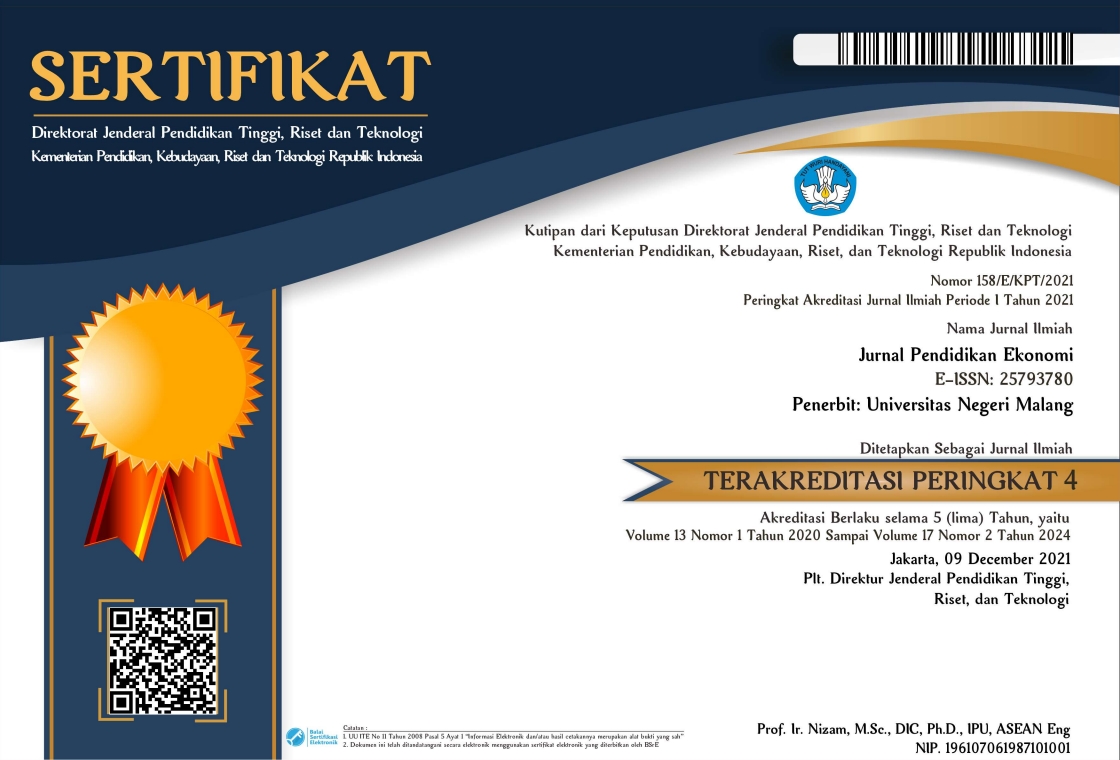Pengembangan Model Pembelajaran Daring Berbasis Collaborative Skills
Abstract
This study aims to develop an online learning model based on Collaborative skills which is expected to provide solutions in preparing graduates who have 21st century skills in collaboration skills. This model was developed using the ADDIE method. At the analysis stage before developing the model, exploratory factor analysis was conducted and it was found that overall the four domains/factors had a cumulative percentage of 62.25%. Four factors are able to measure the variable by 62.25%, the rest is measured by other factors. The collaborative skill profile has the lowest score in the formulating domain with indicators of implementation of elaboration in discussion with a score of 69.71 and the highest score in the forming domain, which encourages all members to actively participate with a score of 89.92. At the design stage, this learning is designed in synchronous online learning. The developed model is a jigsaw type collaborative learning model which is carried out online based on collaborative skills. Skills which include forming, functioning, formulating and fermenting are explicitly included in the Jigsaw process that is run online. Based on the results, an effectiveness test was carried out in the experimental class compared to the control class using an independent sample T-Test, N-Gain Score and audience validity test, a significance score of 0.022 was obtained, which means that there is a difference between the experimental and control classes, N-Gain score of 0.056 which means the effectiveness is moderate, and based on the audience's assessment of 88% (very effective).
Keywords
Full Text:
PDFReferences
Akbar, S. (2013). Instrumen Perangkat Pembelajaran (A. Holid (ed.)).
Bates, T. (2018). The 2017 national survey of online learning in Canadian post-secondary education: methodology and results. International Journal of Educational Technology in Higher Education, 15(1). https://doi.org/10.1186/s41239-018-0112-3
Bilfaqih, Y., & Qomarudin, M. N. (2015). Esensi Pengembangan Pembelajaran Daring. In Deepublish (Vol. 1, Issue 1). http://digilib.esaunggul.ac.id/public/UEU-Journal-3642-ari pambudi.pdf%0Ahttp://ejournal.unikama.ac.id/index.php/jst/article/view/842%0Ahttp://ilmukomputer.org
Branch, R. M. (2009). Instructional Design: The ADDIE Approach. In Department of Educational Psychology and Instructional Technology University of Georgia (Vol. 53, Issue 9).
Firman, F., & Rahayu, S. (2020). Pembelajaran Online di Tengah Pandemi Covid-19. In Indonesian Journal of Educational Science (IJES) (Vol. 2, Issue 2, pp. 81–89). https://doi.org/10.31605/ijes.v2i2.659
KPAI. (2020). KPAI Khawatir Kesenjangan Pendidikan di Masa Pandemi Bikin Anak Putus Sekolah. https://www.kpai.go.id/berita/kpai-khawatir-kesenjangan-pendidikan-di-masa-pandemi-bikin-anak-putus-sekolah
Lubis, A. H., Idrus, S. Z. S., & Rashid, S. A. (2020). The exposure of MOOC usage in Indonesia. International Journal of Scientific and Technology Research, 9(2), 2716–2720.
Pawicara, R., & Conilie, M. (2020). Analisis Pembelajaran Daring Terhadap Kejenuhan Belajar Mahasiswa Tadris Biologi Iain Jember di Tengah Pandemi Covid-19. ALVEOLI: Jurnal Pendidikan Biologi, 1(1), 29–38.
Pearlman, B. (2010). Rethinking How Students Learn. In B. James & B. Ron (Eds.), Solution Tree Press (p. 272).
Sadikin, A., & Hamidah, A. (2020). Pembelajaran Daring di Tengah Wabah Covid-19. BIODIK: Jurnal Ilmiah Pendidikan Biologi, 6(2), 212–224. https://doi.org/10.17509/t.v6i2.20887
Sanjaya, R., Nugroho, S. A., Nugraheni, L. Y., Wibhowo, C., Muniarti, C. T., Haryanti, K., Trimeiningrum, E., Setyowati, L., Riyandari, A., Ananingsih, V. K., Saptaastuti, R. R., & Sitinjak, E. (2020). 21 Refleksi Pembelajaran Daring di Masa Darurat (R. Sanjaya (ed.)). Universitas Katolik Soegijapranata.
Sinombor, S. H. (2020). KPAI : Jangan Buat Siswa Terbebani karena Pembelajaran Jarak Jauh. KOMPAS, 1–5. https://kompas.id/baca/humaniora/dikbud/2020/05/02/kpai-jangan-buat-siswa-terbebani-karena-pembelajaran-jarak-jauh/
Taufik, A. (2019). Perspektif Tentang Perkembangan Sistem Pembelajaran Jarak Jauh Di Kabupaten Kutai Kartanegara Kalimantan Timur. Jurnal Pendidikan&Konseptual, 3(2), 88–98. https://doi.org/DOI:http://doi.org/10.28926/riset_konseptual.v2i4.111
Wahyono, P., Husamah, H., & Budi, A. S. (2020). Guru profesional di masa pandemi COVID-19: Review implementasi, tantangan, dan solusi pembelajaran daring. Jurnal Pendidikan Profesi Guru, 1(1), 51–65. http://ejournal.umm.ac.id/index.php/jppg/article/view/12462
Zhafira, N. H., Ertika, Y., & Chairiyaton. (2020). Persepsi Mahasiswa Terhadap Perkuliahan Daring Sebagai Sarana Pembelajaran Selama Masa Karantina Covid-19. Jurnal Bisnis Dan Kajian Strategi Manajemen, 4, 37–45.
Refbacks
- There are currently no refbacks.

Jurnal Penddidikan Ekonomi is licensed under a Creative Commons Attribution-NonCommercial-ShareAlike 4.0 International License





